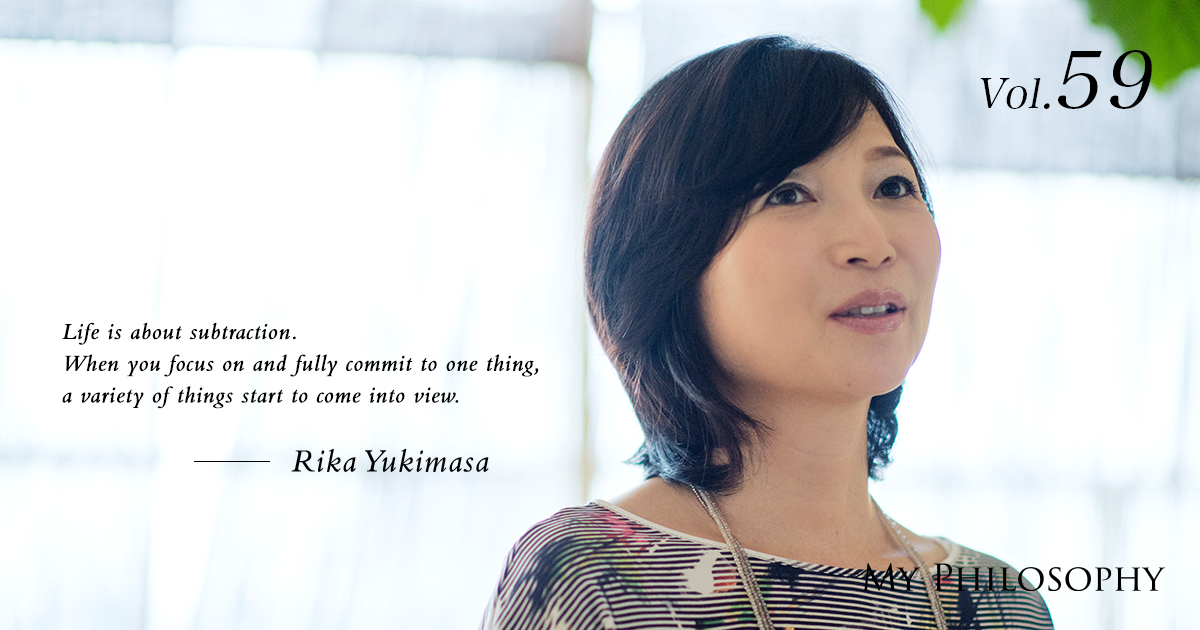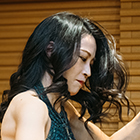
Rika Yukimasa, a culinary researcher, has expanded her activities to include planning and managing a children's portal site, offering recipe apps, and running restaurants. We spoke with her about the inspiration behind the creation of her English learning app and her journey so far.
Profile
Vol.59 Rika Yukimasa
Culinary Researcher | CEO, REKIDS Co., Ltd.
Born in Fukuoka Prefecture in 1966. At the age of 18, she studied abroad in the United States and graduated from the University of California, Berkeley. After joining Dentsu Inc., she excelled as a commercial producer. While still employed, she began her career as a culinary researcher, gaining popularity with her simple adaptations of delicious dishes discovered in various countries. In 2007, she left Dentsu and launched the children’s portal site “Naruhodo! Agent.” In May 2015, she released the iPhone and Android app “What’s for Dinner Tonight? FOOD/DAYS.” In November 2017, she launched “Karaoke! English,” a digital junior high school grammar learning tool. Since 2011, she has hosted the NHK World English-language cooking show “Dining with the Chef.” She also runs the steakhouse “Food Days” in Shimbashi.
Her major publications include “Menu for When Guests Come (Dareka Kuru Hi No Menu)” (published by Bunka Publishing Bureau), “Let’s Make Sweets! (Souda. Okashi wo Tsukurou!)” (published by Bunka Publishing Bureau), the essay “Kindness Round-and-round” (Yasashisa Guruguru)” (published by Bungeishunju Ltd.), “Cooking Dinner from 7 PM (Jyu ku ji kara Tsukuru Gohan) ” (published by Kodansha Ltd.), “Rika Yukimasa’s Interior Design (Yukimasa Rika no Interior)” (published by Kodansha Ltd.), and approximately 45 other books.
Note: Titles and positions are as of the time of the interview (July 2017).
A Concept Born on the Train

I left a stable job without much thought and decided to become independent. During the first ten years, my work in children’s content was a series of failures, which I compensated for with my culinary endeavors. However, as we entered an era where books no longer sold as they once did, I realized I needed to reassess my approach to work. Although my employees were all happily engaged in their work, I was reluctant to simply give up and close shop just because the times had changed. Despite continuous efforts, the company’s sales visibly declined, and I was desperate to find a solution.
One day, while riding the train, the idea of leveraging English for business suddenly struck me. I recalled the pattern practice method I had learned in the ESL (English as a Second Language) classes in the U.S., and that’s how the idea for “Karaoke! English” was born. Although it’s a complex system, the concept came together with incredible speed, as if everything clicked into place in my mind.
I spent countless days, from 6 a.m. until I went to bed at night, crafting around 4,000 example sentences and considering 20,000 illustrations to accompany them. I was glued to my computer, to the point where I felt rooted to my chair, except for meal times. My family was concerned about my health, but I was enjoying myself. Because I believed something would come of it, I was able to persevere, even when others thought it was impossible. When you’re busy and active, your brain works diligently, generating various ideas. Conversely, when your life stagnates, so does your mind, leading to a bad cycle where you lose your drive and the ability to adapt to change.
Pursuing Education at the Urging of Others

I didn’t have any particular dreams growing up and spent my days without much thought. In high school, my grades were fourth from the bottom in my class. Typically, parents would scold you to “try harder!” in such a situation, but my father was different. He told me, “You don’t have to go to university. If you don’t like studying, there’s no point in forcing it. Instead, find the best thing within a 5-kilometer radius of our home and turn it into your profession.” However, finding a profession that an 18-year-old could pursue within a 5-kilometer radius was challenging. I remembered being praised for my English pronunciation, which was one of the few things I felt somewhat confident about. My father responded, “Then aim to be the best in English.” That’s how I ended up studying abroad in my senior year of high school.
In the U.S., my host father suggested that I continue my education by attending a community college rather than stopping at high school. He offered me a job if I needed money and even offered to lend me the tuition fees for university. So, I worked while attending community college. Later, a community college professor encouraged me to transfer to a four-year university. When I told him I didn’t have the money to apply, he handed me $100 and said, “Use this to apply.” As a result, I was accepted into all the universities I applied to, including UCLA, UC Berkeley, and UC Davis.
The reason I, who was fourth from the bottom in my class, was able to work so hard was because I wanted to repay my father, who had made every effort to gather the funds for me to attend community college and then university, even though he had originally said I should start working after high school. I also had a resolve that this would be the last time in my life to study, so I would give it my all.
Protecting a Child’s Confidence

When my eldest daughter was attending a cram school for her junior high entrance exams, I discovered that she had been drawing flipbook-style animations in her expensive textbooks, which cost around 50,000 yen. The story was about a family of penguins, depicting the journey of one penguin from meeting its partner to the birth of their child. I genuinely felt, “This is wonderful!” She then expressed that she didn’t want to go to cram school anymore and wanted to pursue art instead. I was faced with the difficult decision of either letting her spend three years doing nothing productive until the end of elementary school or pushing her to take the entrance exams.
After much consideration, I decided that I had to protect what she loved. I told her, “I’ll use the money we were spending on cram school for art classes instead. The path of an artist is tough, so I’d like you to start learning English at the same time. You don’t need to take the entrance exams. But in exchange, make sure you become proficient enough in both art and English so that you can work even if you don’t go to university. How does that sound?” She cried tears of joy.
I believe it’s important for parents to help their children find what they love and to protect that passion. Parents shouldn’t impose their own values on their children. However, making such a decision requires a mother who believes that “going to university isn’t everything in life.” My own mother was of the mindset, “It’s okay not to go to university. If everyone in the world were a genius, society would be a dull place.” I was raised with that kind of freedom, and it allowed me to approach my own children in the same way.
It’s okay not to be constantly working hard. It’s okay to have idle time. Looking back on my own life, it was during those idle moments that the desire to do something suddenly emerged.
Specializing in One Thing

There’s something I definitely want to teach my children: “confidence and tolerance.” I believe that if a person has these two qualities, they can navigate life successfully. With confidence and conviction, and the ability to accept different cultures and values—even if they don’t fully understand them—their world will expand. When I attended community college, I realized that with effort, I could achieve things, which helped me gain confidence. On the other hand, when I joined Dentsu, a major advertising agency, I encountered people who were so talented that I couldn’t match them no matter how hard I tried. In such an environment, I constantly questioned myself, asking how I could become the best in a field where I could stand out, even among these exceptionally talented individuals, as my father had once advised, “Aim to be the best within a 5-kilometer radius.”
My children are somewhat similar to me. Therefore, I want them to avoid the well-trodden path that everyone else takes and instead choose the less-traveled path, even if it’s thorny. Although it’s a difficult path with no one ahead to follow, it allows them to progress in a way that feels true to themselves, rather than running a marathon on the main road with everyone else. When they reached middle school, I gave them a computer and taught them how to use Adobe Illustrator. I want them to be able to create their own websites and shape their personal brands.
Life is about subtraction. People often think in terms of addition, like sending their children to this cram school, having them learn that skill, and enrolling them in that middle school. But it’s also important to subtract, to remove what isn’t necessary, and focus on the one most important thing. At the end of pursuing that one thing, I believe a wider world will open up once again. I feel that when children’s lives are filled with too many things, it becomes difficult for their sensibilities to develop. Time is finite, and if they spread themselves too thin across many activities, they won’t be able to delve deeply into any one of them. By patiently focusing on one thing at a time, they’ll eventually find connecting points, and everything will naturally come together.
Looking back on my life, I find it curious that the most important decisions were always made at the dining table. When my father told me, “You don’t need to go to university,” it was at breakfast. When my host father encouraged me to continue my education, it was also at the dining table. The dining table is where people relax and transform their thoughts into words. In hindsight, the words spoken there have had significant meaning. That’s why I love not just food, but also coordinating the entire dining experience and the atmosphere around it.
Reflecting on my life and thoughts through words has led to new discoveries. In a way, like the protagonist of the movie Forrest Gump, I realized that by following the advice of the trustworthy people around me, I ended up where I am today. Mr. Sugiyama, who drew out these stories, is not only great at talking but also an incredibly good listener. I truly admire the power to cherish and shape a single idea into something tangible. Thank you for such a wonderful time.
Culinary Researcher, Rika Yukimasa
Rika Yukimasa is a Doer. While her role as a culinary researcher is often in the spotlight, I interviewed her to gain deeper insights into her mindset and roots. Her decisiveness, drive, and sharpness in expression are truly remarkable. One commonality we share is a tenacity that doesn’t rely on the notion of “things will work out” but rather on “making things work” when faced with unexpected challenges. Listening to her approach to parenting reaffirmed the importance of understanding the unique qualities and characteristics of the person being raised. It is essential for those in a nurturing role to be aware of these traits, as raising someone in an ordinary way will likely result in an ordinary outcome. I’ve decided, perhaps presumptuously, that we’ll continue to inspire each other and collaborate on the global stage!
This is the 59th edition of My Philosophy. I am deeply grateful for the valuable time spent in each of these one-on-one conversations. To my delight, these interviews keep pushing me to grow even more (laughs).
July 2017, at REKIDS Co., Ltd. Translated by ILI Inc.




































































































































